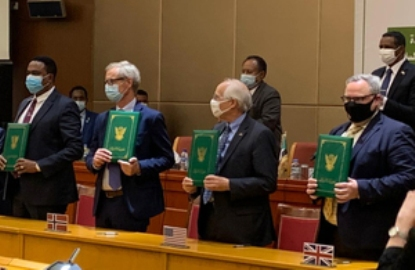Troika countries on Tuesday signed the Juba Peace Agreement (JPA) as witnesses to signal their political support for the deal and called on the Sudanese government to fully implement peace and democratic reforms.
The transitional government and the two factions of the Sudanese Revolutionary Front (SRF) signed a peace agreement in Juba on 3 October 2020 but the Troika countries did not sign it as witnesses.
A signing ceremony was held in Khartoum on Tuesday with the presence of Prime Minister Abdallah Hamdok, the deputy-head of the Sovereign Council Mohamed Hamdan Dagolo “Hemetti” and three other members of the Council including al-Hadi Idriss Malik Agar and Tahir Hajar.
The Troika countries were represented by their special envoys for Sudan, Donald Booth of the US, Robert Fairweathe of the UK and Endre Stiansen of Norway. Also, the event was attended by the IGAD Executive Secretary Workneh Gebeyehu.
In a joint statement, the Troika said the signing as witnesses was “a signal of political support to the Agreement”.
“’(…) This further step demonstrates our commitment to the success of the Agreement and its potential to help meet the calls of the Sudanese people for freedom, peace, and justice, including for those affected by conflict in Darfur, South Kordofan and Blue Nile states, as well as other historically marginalised parts of Sudan,” added the statement.
The three countries took this opportunity to call for the full implementation of the agreement and to establish the long-time awaited transitional legislative council.
They pinpointed the formation of the joint force and the establishment of the ceasefire monitoring mechanism, saying they are key for protecting civilians in the Darfur region.
Furthermore, the Troika called for sustainable justice in the country as agreed in the peace agreement stressing the need to deal with gender-based violence and conflict-related sexual violence. Also, they urged the government to be committed to its pledge to cooperate with the ICC on Darfur crimes.
“Moving forward we call for full, equal and meaningful participation of women at all levels of governance and in legislation,” added the statement.
The Sudanese government and the signatory groups agree that the lack of money and the difficult economic conditions negatively impacted the implementation process.
Sovereign Council Member and chairman of the SRF Chairman Hadi Idriss in his remarks spoke about the “limited implementation” of the JPA particularly the security arrangements and justice saying they are crucial for the IDPs and refugee return to their area of origin.
Idris said the implementation process needs funding and technical assistance as the transitional government cannot enforce the agreement alone.
“Especially the security arrangements and the deployment of joint security forces, a critical step for durable peace and Sudan’s political transformation. There cannot be successful transition without sustainable peace and security,” he said.
“This assistance is urgently needed to stem the current outbreak of violence in Darfur, Two Areas and across Sudan,” he emphasized.
The government and the armed groups agreed to organize a donor meeting to support the implementation process, but the COVID-19 crisis prevented the holding of this conference.

